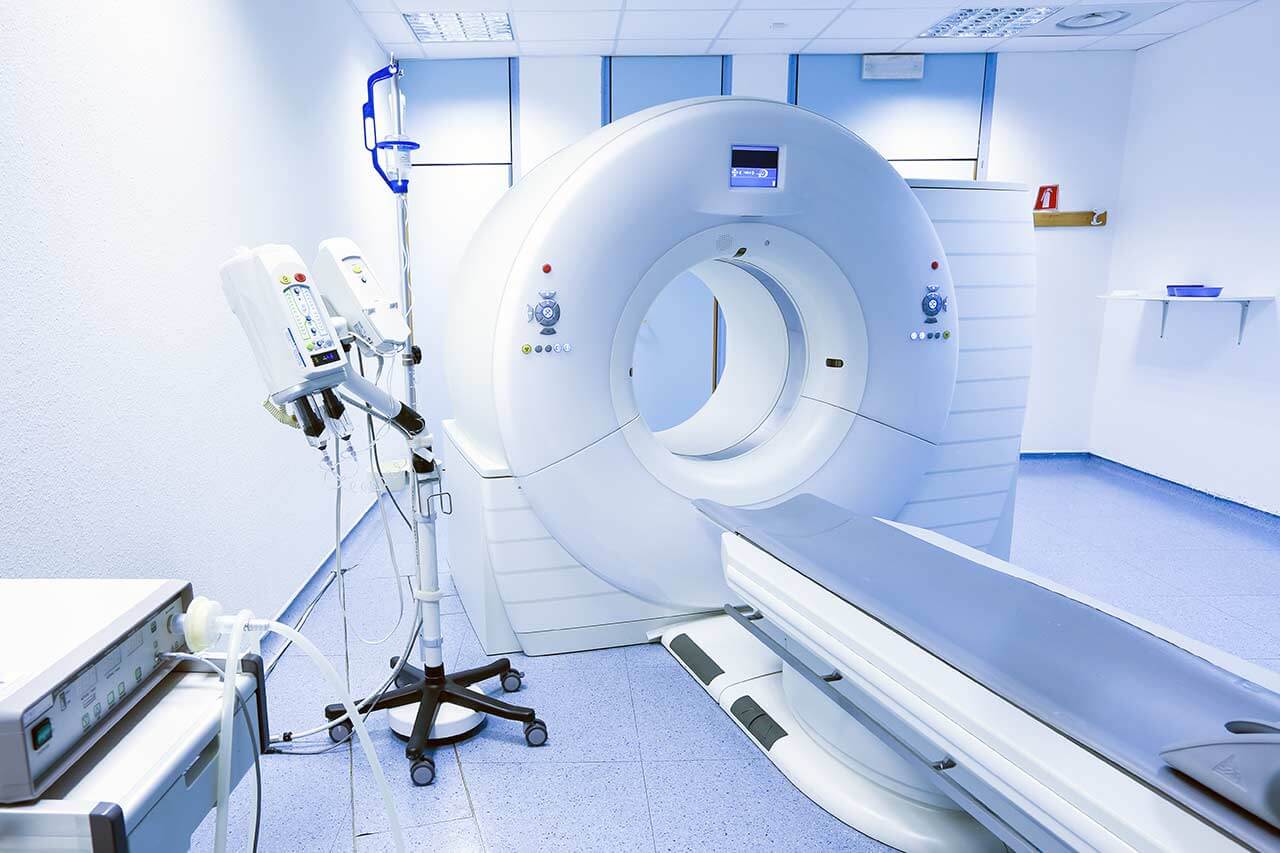
The program includes:
- Initial presentation in the clinic
- clinical history taking
- review of medical records
- physical examination
- laboratory tests:
- complete blood count
- general urine analysis
- biochemical analysis of blood
- TSH-basal, fT3, fT4
- tumor markers
- inflammation indicators (CRP, ESR)
- indicators of blood coagulation
- abdominal ultrasound scan
- CT scan/MRI or PET-CT of abdomen
- preoperative care
- cytoreductive surgery to remove visible tumors
inside the abdomen and HIPEC - histological and immunohistochemical
examination of removed tissues - symptomatic treatment
- cost of essential medicines
- nursing services
- stay in the hospital with a full board
- accommodation in a 2-bedroom ward
- elaboration of further recommendations
How program is carried out
During the first visit, the physician will conduct a clinical examination and go through the results of the available diagnostic tests. After that, you will undergo the necessary additional examination, such as the assessment of liver and kidney function, ultrasound scan and tomography of the abdominal organs. Based on the results of the examination, the physician will choose the surgical technique and the type of anesthesia. After that, preparation according to the preoperative standard will start.
Cytoreductive surgery begins with general anesthesia. The intervention is performed as open surgery, i.e. through the incision in the anterior abdominal wall, so that the surgeon can carefully examine the peritoneum and the surface of the abdominal organs. The surgeon removes affected by the malignant process areas of the colon and peritoneum, metastases in other internal organs. This stage of the operation can take several hours, since the overall effectiveness of the treatment depends on the completeness of the malignant tissues removal.
At the next stage of the operation, the surgeon inserts several catheters into the abdominal cavity. Through the catheters, a heated solution of a chemotherapy drug is pumped inside. The special system maintains the required temperature (42-43 degrees Celsius), pressure and circulation rate of the medicinal solution. The solution mechanically flushes out blood clots and remnants of malignant tissues, and a heated chemotherapy drug destroys micrometastases in internal organs and lymph nodes (micrometastases can’t be detected by the naked eye).
After 1-1.5 hours, the chemotherapy drug is removed from the abdominal cavity and the abdominal cavity is washed with saline. After that, the surgeon removes the catheters and sutures the incision of the anterior abdominal wall.
After the completion of the operation, you will be transferred to the ward of the intensive care unit, under the round-the-clock supervision of doctors and nurses. In 1-3 days after the operation, your drains will be removed and you will be transferred to a regular ward for further recovery. The whole treatment takes 10-12 days on average.
Finally, the attending physician will evaluate the results of control examinations, schedule the date of discharge from the hospital and give you detailed recommendations for further follow-up and treatment.
Required documents
- Medical records
- Esophagogastroduodenoscopy (EGD), MRI/CT scan (not older than 3 months)
- Biopsy results (if available)
Service
You may also book:
 BookingHealth Price from:
BookingHealth Price from:
About the department
According to the Focus magazine, the Department of General, Abdominal and Transplant Surgery at the University Hospital Heidelberg ranks among the top German departments specializing in bowel cancer treatment!
The department offers the full range of services in these medical fields and guarantees the first-class medical care at the university level. The department specializes in the treatment of diseases of the abdominal cavity, esophagus and thyroid gland, transplantation of liver, kidney and pancreas. The medical facility has won the reputation of one of the three largest and most successful Transplant Centers in Germany. The department is headed by Prof. Dr. med. Markus W. Büchler, who is one of the best doctors in Germany, according to the Focus magazine rating. He has performed a number of successful operations, productive examinations, which contribute to the development of modern medicine.
It is worth noting that bariatric surgery (obesity treatment) is also included in the department’s tasks. The specialists demonstrate outstanding results in the treatment of oncopathology of the abdominal organs and sarcomas, liver, kidney and pancreas transplantation. Also, within the clinical practice, doctors hold highly-specialized consultations on rare diseases and provide 24-hour emergency care.
The excellent technical equipment and high competence of the department's surgeons allow them to perform simple classical operations and extremely complex interventions. The preference is always given to sparing minimally invasive techniques, which today are the gold standard in surgery.
The service range of the department includes:
- Surgical treatment of malignant diseases of the gastrointestinal tract
- Esophageal cancer
- Stomach cancer
- Small and large bowel cancer
- Rectal cancer
- Liver cancer
- Gallbladder cancer
- Pancreatic cancer
- Sarcomas
- Surgical treatment of pancreatic diseases (for example, acute pancreatitis)
- Surgical treatment of bowel diseases
- Crohn's disease
- Colitis
- Papillary adenocarcinoma
- Diverticulitis
- Hereditary familial non polypoid colorectal cancer
- Familial adenomatous polyposis
- Surgical treatment of liver diseases (all types of resections, as well as innovative techniques using LigaSureTM, Ultracision® and Habib®-Sealer endovascular devices)
- Benign liver diseases
- Liver cysts
- Hemangiomas
- Focal nodular hyperplasia
- Adenoma
- Liver abscess
- Echinococcal cyst
- Malignant liver diseases
- Hepatocellular carcinoma
- Cholangiocarcinoma
- Liver metastases
- Benign liver diseases
- Surgical treatment of diseases of the endocrine organs (thyroid, parathyroid glands, adrenal glands)
- Goiter
- Hyperthyroidism
- Hypothyroidism
- Surgical treatment of stomach diseases
- Stomach ulcer
- Gastroesophageal reflux disease (heartburn)
- Surgical treatment of spleen diseases
- Surgical treatment of the esophageal diseases
- Diverticulitis
- Zenker's diverticulum
- Achalasia
- Esophageal lesions
- Surgical treatment of hernias
- Inguinal hernia
- Abdominal hernia
- Femoral hernia
- Incisional hernia
- Transplant surgery
- Liver transplantation
- Kidney transplantation
- Pancreatic transplantation
- Bariatric surgery (obesity treatment)
- Minimally invasive surgery
- Other medical services
Curriculum vitae
Special Fields of Interest
- Pancreas, Liver, Gastrointestinal Tract and Transplant Surgery.
Education and Work Experience
- 1974 - 1979 Study of Medicine, Ruprecht Karl University of Heidelberg.
- 1979 - 1980 Clerkship, Free University of Berlin.
- 1980 Medical Approbation.
- 1980 Doctoral thesis defense (Dr. med.), University of Heidelberg.
- 1981 - 1982 Advanced training in General and Cardiac Surgery, Department of Surgery, Free University of Berlin (Head: Prof. E.S. Bücherl).
- 1982 - 1984 and 1985 - 1987 Advanced training in General Surgery, Department of General Surgery, University of Ulm (Head: Prof. H.G. Beger).
- 1984 - 1985 Advanced training in Emergency and Orthopedic Surgery, Department of Emergency and Orthopedic Surgery, University of Ulm (Head: Prof. C. Burri).
- 1987 Board Certification in Surgery, University of Ulm.
- 1987 Habilitation (Thesis), University of Ulm.
- 1991 Associate Professor, Vice Chairman, Senior Physician in General Surgery, Department of General Surgery, University of Ulm (Head: Prof. H.G. Beger).
- 1993 - 2001 Professor of Surgery and Chairman of the Department of Abdominal and Transplantation Surgery, University of Bern, Switzerland.
- 1999 Head of the Department of Gastrointestinal, Liver and Lung Diseases, University of Bern, Switzerland.
- Since 2001, Head of the Department of General, Abdominal and Transplantation Surgery, University Hospital Heidelberg.
- Since 2003, Managing Medical Director of the Department of Surgery, University Hospital Heidelberg; in parallel: Head of the Departments of Surgery at the Salem Hospital, Heidelberg (since 2005), at the General Hospital in Sinsheim (since 2009), at the General Hospital in Eberbach (since 2012), and at the General Hospital in Heppenheim (since 2013).
Memberships in Professional Societies
- 1993 German Society of Surgery.
- 1983 European Pancreatic Club.
- 1984 German Society for Digestive and Metabolic Diseases e.V.
- 1984 International Association of Pancreatology.
- 1984 Berlin Surgical Society.
- 1987 Professional Association of German Surgeons e.V. (BDC).
- 1989 American Pancreatic Association.
- 1990 American College of Gastroenterology.
- 1991 Society for Surgery of the Alimentary Tract.
- 1991 Section Surgical Research of the German Society of Surgery.
- 1992 European Society for Surgical Research (ESSR).
- 1992 International Society for Regional Cancer Therapy (ISRCT).
- 1993 International Society of Surgery (ISS).
- 1993 International Gastro-Surgical Club (IGSC).
- 1994 Swiss Society of Surgery.
- 1994 Swiss Society of Visceral Surgery.
- 1994 Swiss Society of Gastroenterology and Hepatology (SGGH), (E.A.E.S.).
- 1994 Working Association for Laparo- and Thoracoscopic Surgery (Switzerland).
- 1994 Collège International de Chirurgiens, Swiss Section.
- 1994 Surgical Infection Society – Europe (SIS).
- 1994 Functional Brain-Gut Research Group.
- 1994 Association of Middle Rhine Surgeons.
- 1994 German Society for Obesity Research.
- 1994 World Association of Hepato-Pancreato-Biliary Surgery.
- 1994 International Hepato Pancreato Biliary Association (IHPBA).
- 1995 European Society of Parenteral and Enteral Nutrition (ESPEN).
- 1995 European Surgical Association.
- 1995 Association of Bavarian Surgeons.
- 1995 Society of Gastroenterology in Bavaria.
- 1995 Austrian Society of Surgery.
- 1995 New York Academy of Sciences.
- 1995 European Association for Gastroenterology and Endoscopy (EAGE).
- 1995 Collegium Internationale Chirurgiae Digestive (CICD).
- 1995 European Digestive Surgery (EDS).
- 1995 Swiss Working Group for Coloproctology.
- 1995 Swiss Association for Surgical Research.
- 1996 Swiss Society of General Surgery (SGAC).
- 1996 German Interdisciplinary Association for Pain Therapy (DIVS).
- 1998 International Society for Diseases of the Esophagus (ISDE).
Scientific Appointments
- 1988 - 1993 Organization, Gastroenterological Colloquium of the University of Ulm.
- 1988 Member of the Editorial Board, International Journal of Pancreatology.
- 1989 - 1991 Member of the Selection Committee, European Pancreatic Club.
- 1989 - 1992 Member of the Program Committee, German Society for Digestive and Metabolic Diseases.
- 1991 General Secretary, European Pancreatic Cancer Study Group.
- 1992 Scientific Advisory Board, Working Group of the Pancreatectomized.
- 1992 - 1994 German Society of Surgery, Surgical Forum.
- 1993 Associate Editor, Pancreas.
- 1996 Honorary Member, Academic Association of Medical Interdisciplinary Studies.
- 04 - 06 July, 1996 Visiting Professor, University of Belgrade, Clinical Centre of Serbia, School of Medicine, Institute for Digestive Diseases, Belgrade, Yugoslavia.
- 1996 - 2000 Member of the International Scientific Committee, International Hepato Pancreato Biliary Association.
- 1996 Member of the Executive Board, Swiss Society of Surgery.
- 1996 Corresponding Member, Sociedad Argentina de Gastroenterologia.
- 1993 Editor, Surgical Gastroenterology.
- 1994 Member of the Editorial Board, Acta Chirurgica Austriaca.
- 1994 Member of the Extended Executive Committee, International Gastro-Surgical Club.
- 1995 Editor, Minimal Invasive Chirurgie.
- 1995 Chief Editor, Digestive Surgery.
- 1995 Member of the Editorial Board, Swiss Surgery.
- 1995 Member of the Educational Committee, European Association for Endoscopic Surgery and other interventional techniques (E.A.E.S.).
- 1995 Chief Editor, Progress in Surgery.
- 1995 Editor of the Section, The Oncologist.
- 1995 Corresponding Member, Austrian Society of Surgery.
- 1995 Member of the Editorial Board, Bit Surgery.
- 1995 General Secretary, European Digestive Surgery (EDS).
- 1996 Scientific Advisory Council, Medizin im Bild.
- 1996 Working Committee, German Society of Surgery: Section Surgical Research.
- 1996 Member of the Editorial Board, Progress in Surgery.
- 1996 Councillor, International Association of Pancreatology.
- 22 - 25 May, 1996 Visiting Professor, Yale University, School of Medicine, Department of Surgery, New Haven, USA.
Publications
- The results of both clinical and laboratory studies were published in over 1500 articles in the medical journals.
Awards
- 1987 Ludwig-Rehn-Award, Association of Middle Rhine Surgeons.
- 1988 Award of the International Association of Pancreatology, Verona, Italy.
- 1990 Award of the International Association of Pancreatology Nagasaki, Japan.
- 1991 Research Award of the Society of Computed Tomography Seattle, USA.
- 1991 Award, Association of Middle Rhine Surgeons, Luxembourg.
- 1993 Award of the International Congress on Anticancer Chemotherapy Paris, France.
- 1993 Award of the European Association for Gastroenterology and Endoscopy, Barcelona, Spain.
Photo: (с) depositphotos
About hospital
According to Focus magazine, the University Hospital Heidelberg ranks among the top five hospitals in Germany!
The hospital is one of the most advanced and reputable medical institutions not only in Germany but throughout Europe. There are more than 43 specialized departments and 13 medical institutes which cover all fields of modern medicine. A distinctive feature of the hospital is the presence of unique therapeutic methods for the treatment of complex and rare clinical cases.
Due to successful clinical practice, the hospital has been holding leading positions in the international medical arena for many years. The basis for this popularity is the combination of the very latest technologies, competent specialists, and active research activities, which allows introducing of revolutionary diagnostic and treatment methods, which save lives.
In addition to the outstanding medical achievements, it is worth noting a particularly friendly and pleasant atmosphere, and respectful attitude towards the patient. Both doctors and nursing staff make every effort to meet all the needs and wishes of the patient, pay due attention to each clinical case, and have personal communication with the patient, which contributes to a positive treatment result.
Photo: (с) depositphotos
Accommodation in hospital
Patients rooms
The patients of the University Hospital Heidelberg live in comfortable single and double rooms designed in bright colors. Each room is equipped with an ensuite bathroom with a shower and toilet. The patient rooms are quite spacious, they have a table with chairs for receiving visitors. Roomy wardrobes are provided for storing personal belongings. It is possible to connect to the Internet. In addition, the hospital offers enhanced-comfort rooms with a safe, refrigerator, and upholstered furniture. Patients have 24-hour access to the services of medical personnel.
Meals and Menus
The patient and his accompanying person have a daily choice of three menus. If you for some reason do not eat all the products, you will be offered an individual menu. Please inform the medical staff about your dietary preferences prior to the treatment.
Further details
Standard rooms include:
Religion
The religious services are available upon request.
Accompanying person
During the inpatient program, an accompanying person may stay with you in a room or hotel of your choice.
Hotel
During the outpatient program, you may live in a hotel of your choice. The managers will help you choose the most suitable options.
The hospital offers a full range of laboratory tests (general, hormonal, tests for infections, antibodies, tumor markers, etc.), genetic tests, various modifications of ultrasound scans, CT scans, MRI and PET / CT, angiography, myelography, biopsy and other examinations. Treatment with medications, endoscopic and robotic operations, stereotaxic interventions is carried out here, modern types of radiation therapy are also used. The hospital offers patients all the necessary therapeutic techniques.
- Endovascular treatment of liver pathologies with LigaSureTM, Ultracision® and Habib®-Sealer devices
- Correction of chest deformities in children (Nass operation)
- Minimally invasive direct coronary artery bypass grafting
- Replacement of ascending aorta (David procedure)
- Operations using the da Vinci robotic system
These are primary lung tumors and metastases in the lungs, benign and malignant liver pathologies, thyroid pathologies, gastroesophageal reflux disease, heart rhythm disturbances and heart failure, infertility, fibromyalgia, damages and pathologies of large joints, polyneuropathy and other diseases.
- Thoracic surgery
- Cardiac surgery
- Urology
- Orthopedics and traumatology
- Obstetrics and gynecology
The hospital's team consists of more than 13,000 highly qualified employees




